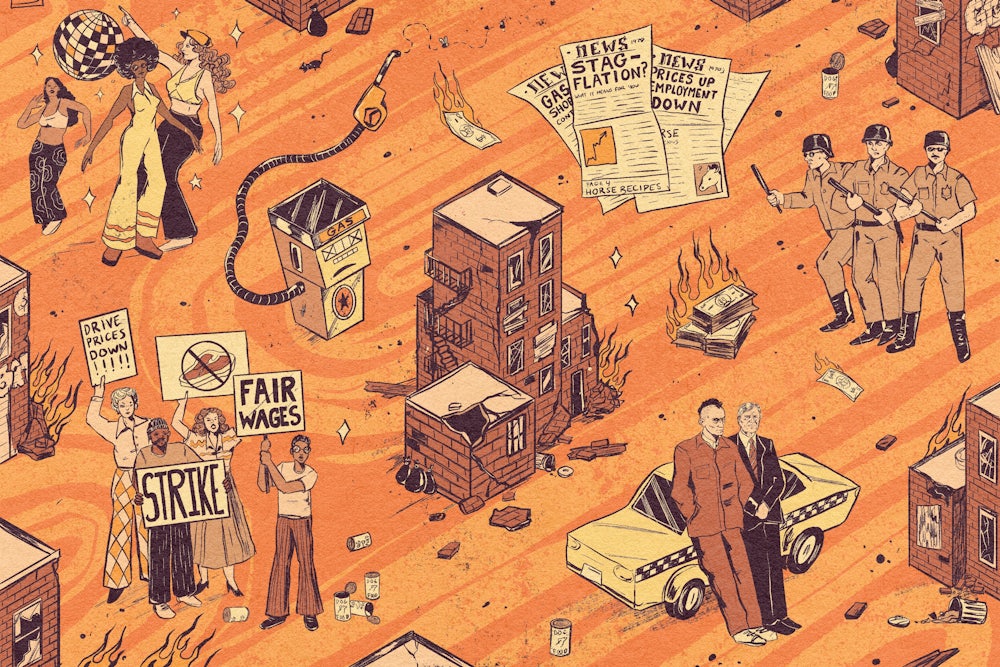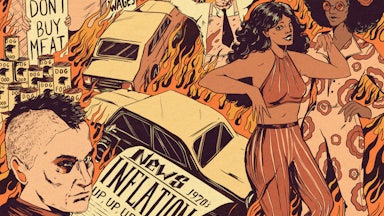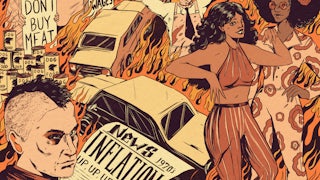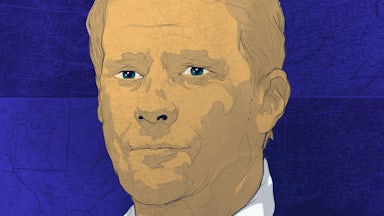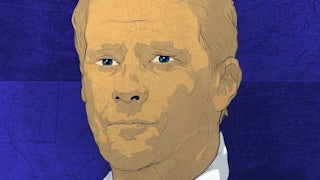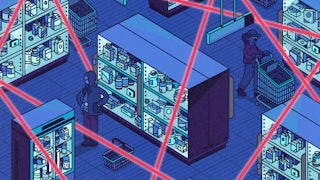Are we headed back to the 1970s? Politicians and pundits from across the political spectrum insist we are. They also make clear that nothing could be worse. Why is the decade so feared? What kinds of policy do the grim warnings justify? On episode 56 of The Politics of Everything, hosts Laura Marsh and Alex Pareene speak with the writer Aaron Timms about “nostophobia,” a term he coined to describe a condition that is something like the opposite of nostalgia, and “’70s syndrome,” the variant currently gripping our collective imagination. It’s hard to see how we fix the problems of today with the same failed policy solutions of the 1970s—but that isn’t stopping anyone from trying.
Kim Reynolds [news clip]: It feels like President Biden and his party has sent us back in time.
Larry Summers [news clip]: We’re going to have a situation like we did in the 1970s.
Niall Ferguson [news clip]: Let’s consider the possibility that the 2020s could actually be worse than the 1970s.
Laura: The 1970s were the decade of strikes, recession, oil crises, stagflation, crumbling cities, rising crime.
Alex: Even as those years recede from living memory, they linger in the discourse as a cautionary tale.
Laura: The experience of the 1970s is used to justify tough-on-crime policies.
Alex: It’s also used as a cudgel against labor: “If workers demand too much, we’ll be back to the ’70s.”
Laura: These warnings have been circulating for a long time, but since Joe Biden took office in 2021, fear of the 1970s has peaked.
Alex: Economists and pundits now insist we are already replaying the ’70s with inflation, the fuel crisis in Europe, and war.
Laura: Today on the show, we’re talking about why people are so afraid of the 1970s, and whether we’re really headed back there. I’m Laura Marsh.
Alex: And I’m Alex Pareene.
Laura: This is The Politics of Everything.
Alex: It seems like everyone on television and in newspapers is warning these days that the U.S. is on the brink of returning to the 1970s. Treasury Secretary Janet Yellen has said the 1970s were the decade to which nobody wants to return. Gerald Baker, former editor of The Wall Street Journal, said American cities became hellscapes in the 1970s. One economist called the decade a horror movie. On the right, the left, and the center, there’s a palpable anxiety that the troubles of that era are descending again. We’re speaking now with Aaron Timms, who recently wrote an article for The New Republic about this fear of the 1970s. Aaron, thanks for coming on the show.
Aaron Timms: Well, thank you for having me.
Alex: What was so bad—in this view, in this telling—what was so bad about the 1970s? What are these people warning that we’re returning to?
Aaron: The most immediate source of the analogies is inflation. Inflation reached double digits in the middle of the 1970s and was a persistent problem throughout the 1970s, and it was driven by factors that feel familiar to the situation that we’re in today. There was an energy shock; there was a food crisis. When I talk about inflation today, of course, we’re in the position where supply chain shocks have caused consumer goods prices to increase. That’s the basis for this analogy. But thinking more broadly about what was so scary about the 1970s, yes, inflation was this big intractable problem, but I think a lot of these references to the 1970s are driven by a fear of lawlessness, especially in cities. The caricature, if you like, of the 1970s is as the decade of Mean Streets and Taxi Driver and The French Connection—this sort of very dark, gritty time when there was a lot of crime in the inner cities and white people especially were fleeing to the suburbs.
Alex: It seems like the people who are speaking about the return of the ’70s in these sort of apocalyptic terms—they’re not just making an economic argument about inflation and interest rates. There’s a moralistic part of it that I think you touched on.
Aaron: There is absolutely this sort of moralistic argument. You had this culture of permissiveness and freedom that came out of the 1960s, so people felt emboldened to press their claims on the state, which led to a rise in activism, let’s say, very generally speaking. You combine that with these problems with law and order, with urban insecurity, and I think it just feels like a decade where the economy was spiraling out of control, law and order was spiraling out of control, and people were becoming, generally speaking, too entitled—and that that’s really what we need to be scared of.
Laura: When you hear people saying, “We can’t go back to the 1970s,” is that coming from the right or the center? How widespread are these warnings?
Aaron: It actually cuts across political lines. You get a lot of Trumpist figures, like, let’s say, Peter Navarro and Larry Kudlow, warning about a return to the 1970s. But then you get slightly more respectable conservatives, like Niall Ferguson. (I’m not sure that he quite fits that description.) Then you have figures who are very much part of the Democratic establishment. Larry Summers is someone who’s warning pretty much every day now about a return to the 1970s. So it is fairly widespread and shared across partisan lines and across the professions as well.
Laura: Before we get into talking about how some of those ways of thinking about the ’70s might be wrong, I want to talk about the fear itself. In the piece you coin a term: nostophobia, fear of the past. Talk us through that term: how you came up with it, what you’re thinking about it.
Aaron: I just took the word nostalgia and turned it on its head. I think this is quite an interesting concept—I say as the person who wrote the piece—but those of us who weren’t alive in the 1970s or have no living memory of inflation, when we think about the past or the postwar past, it’s been idealized more in nostalgic terms. We think of nostalgia for the immediate postwar era. Even today, there’s some residual nostalgia for the 1990s, even though in many respects it’s a decade that reflects a lot of the problems that we live with today. This is the first instance that I can think of, certainly in my lifetime, over the last 40 years, where a period of the past is held up as a source of anxiety, as a source of fear. So instead of nostalgia, which is a longing for return to the past, it’s more in the nature of nostophobia. It’s a fear of return. I think it’s risen to the level where it describes a general syndrome and not just something that attaches to one or two discrete personalities.
Laura: So nostophobia is the fear of the past. And then you have this nice phrase in the piece, “’70s syndrome,” which seems to be the dominant strain of nostophobia—that’s the thing that we’re really scared of specifically in the past.
Aaron: Right, exactly.
Alex: What I found really interesting about this is the hold that it has on a lot of members of the media and the political class. Obviously it’s increased in the last two years or so, but there have been inflation hawks warning about this for my entire adult life in the face of consistently deflationary conditions—like, the actual economy was consistently deflationary over that time. But I find fascinating the hold that it had as the ’70s themselves retreated further into the background and fewer and fewer living people had any memory of what the ’70s were actually like to live through. Do you think that as fewer people remember it, does that make its mythic hold on people stronger or weaker?
Aaron: I think it’s at the sweet spot right now, where it’s at the absolute peak of its strength, because you have enough people who have a living memory of the 1970s, and they’re relatively senior figures in politics and media and business and so forth. But then you have enough people who don’t have any memory of the ’70s, so as someone who lived through the ’70s, you can present yourself as a ’70s expert, and your expertise is beyond reproach or beyond question. It occupies this sweet spot—I think the median age of the U.S. population today is about 39, so it’s the point where there’s this almost perfect balance between people who remember the ’70s and those who weren’t around for them.
Laura: After the break, we’ll be back to talk about how this fear of the 1970s is being put to use. What do the nostophobes want us to do to avoid a return to that era?
Laura: We’re speaking with the writer Aaron Timms about a condition he’s identified among politicians and commentators: ’70s syndrome, or the fear of the 1970s. Aaron, let’s talk about the uses of this fear, because it’s being invoked to justify policy choices right now. When, for instance, Larry Summers warns about going back to the 1970s, what kind of things is he recommending that we do today?
Aaron: Yeah, he’s been very explicit about it. He said we need unemployment, and the way to get unemployment is through interest rate hikes. It’s basically a plea for a return to the years of the Volcker shock. Paul Volcker, of course, the chair of the Federal Reserve from 1979 onward, instituted this very punishing regime of interest rate hikes to get on top of inflation. So it’s really an argument for going back to that and doing exactly what was done in the early 1980s, when interest rates got up to 20 percent to break the back of inflation. What you get from that, of course, is you disincentivize businesses to invest. As a result, the businesses don’t do as well, and they have to start laying people off so you end up with unemployment. But it’s kind of remarkable how the solution that is proposed is not simply, “We need interest rate hikes.” It’s: “We need unemployment; we must discipline workers; we must make them take the medicine of unemployment so that we can get on top of inflation.”
Alex: I assume probably a lot more people—I’m talking about people who weren’t there for it, people my age—I assume a lot more of us know about the Volcker shock
now than maybe did a few years ago. But it’s fascinating that it’s presented still as, again, a morality story or in which essentially the bad, bad workers asking for too much were punished. In Reagan’s first term, Volcker induced a recession, an actual recession, crashed the economy, and then—I mean, you can tell us the rest of it, but stock markets began soaring a little bit after that, but the jobs didn’t come back. Yet that’s presented not just as a success but one of the central policy successes of the era.
Aaron: Absolutely. It’s this holy grail, this thing that you cannot question, that the Volcker shock is the thing that finally broke the back of inflation. I think we do need to recognize that inflation was this really damaging and intractable phenomenon throughout the 1970s. But it’s bizarre to me that the conversation today is still very much centered on what the Fed and the Fed alone can do to get on top of inflation, whereas there are many economists, especially those on the left, who are calling for a much more sophisticated and targeted understanding of this very complex phenomenon and who recommend other actors, especially state actors, to take on the responsibility for taming inflation. But the nuance of that conversation is completely lost and the object lesson of the Volcker shock is still held up as the template for what to do in this situation.
Laura: It’s puzzling because there’s this fear of the ’70s, but then the conventional wisdom seems to be that the only way to fight this similar set of problems is by using the very painful solutions that were implemented in the 1970s—which I think in the memory of people who were alive then, if you had family members who were out of work, if you experienced the effects of living in a recession, are also really painful and scary and not something you want to go back to.
Aaron: Exactly, yeah. I don’t actually even really know how to make sense of it; if it’s just sort of a taste for cruelty or something that’s involved in recommending this, especially when, as I say, there are other solutions, which, while they may not have the historical track record of the Volcker shock, are available to us: targeting inflation at its source and figuring out mechanisms through fiscal policy to address inflation.
Laura: You also trace a couple of other shifts that took place in the 1970s as a response to its various crises, such as the shift from industry to finance, production to consumption, welfare state to real estate, and the weakening of labor power, particularly. How do you see those things being replayed now?
Aaron: I think the most interesting one, the one that’s most relevant to today’s inflationary situation, is worker power.
Alex: Right, it seems like this fear of rising labor power is based on the so-called wage-price spiral, which is a process where as goods become more expensive, workers collectively bargain for wage increases, forcing businesses to raise prices, leading to higher wages, and so on, and so on, and so on.
Aaron: Absolutely. When people invoke the ghost of the wage-price spiral today, I think what’s missing from that conversation is the fact that labor is nowhere near as organized. There’s nowhere near the level of collective bargaining. There isn’t anywhere near the level of collective action. So there is this very interesting parallel and distinction between the inflation of the ’70s and the inflation of today, in that today we’ve just come out of a pandemic where a lot of people were put out of work, and suddenly we have this very, very tight labor market where people are coming back into the workforce and there is this huge demand for labor. That gives workers a kind of power, but it’s actually not the same kind of power that workers had in the 1970s. What we have today is strong workers, but they’re totally atomized, and the strength of workers is totally located in the individual worker, as opposed to being something that’s dispersed over a collective. So that’s, I think, a really important distinction.
Laura: And this goes beyond labor.
Aaron: The other thing I think that’s interesting, in terms of this shift from the 1970s to the 1980s, if you like, the post-1970s era, is to think about the role of finance: this shift from industry to finance. The deregulation of capital that took place after the 1970s is of course the status quo that we live with today. There’s so much fealty to the market, and so much fealty to how the market reacts to different economic policies, that’s baked into how political actors think of themselves, and I think that is quite destabilizing—and that, again, is a legacy of the 1970s. It means that we end up with the situation we’re in today, where we have this problem, and instead of understanding it as a problem to be resolved through politics, it’s conceptualized as a problem to be resolved either by the Fed on its own or by the markets. Part of my argument is that this shift of trying to understand things collectively or trying to understand things through politics to simply giving up on political contestation and letting the market decide how to distribute resources is very much a product of the solutions that were developed through the 1970s to these problems of inflation and scarcity.
Alex: You sort of make the case that the ’70s never went away, because you’re talking about the the wage-price spiral and things like that, and, as you say, it was treated as gospel by economists for years and years, but it was based on that historic period where labor had enough power to demand wage increases in line with inflation, not just to demand in the sense of a tight job market but through collective bargaining, through actual contracts that said wages will rise with inflation. I mean, how many people do you know who have contracts that say that now? It seems absurd to cling to that as a law of economics and not as the thing that happened at the time. As you say, the late ’70s and early ’80s deregulation and interest rate hikes and financialization transformed the entire American economy, which makes it seem all the more absurd to me that the argument would be, “We should just do that.” Because we did it. That happened. There’s not a powerful labor movement to crush again, because it’s done.
Aaron: Yes. Exactly. It’s this weird mania for stability that is really popular throughout policy and financial circles: the idea that the worst thing that can happen is that we can destabilize the status quo. I would argue the opposite: The best thing that could happen is if we do that, because the status quo is not working for so many people. But when people invoke this fear of the 1970s, what they’re really asking for is a return to the solutions that emerged out of the 1970s. It’s for more of the same, basically.
Laura: So stripping back more entitlements, the few things that remain, raising interest rates, doing more austerity.
Aaron: Yes, exactly, and fueling the further financialization of the economy, and increasing, or at least preserving, the distance between voters and the elites—the political elites, the business elites—and entrenching what I call the de-democratization of monetary and economic decision-making. One of the legacies of the 1970s, of course, is that we have a very technocratic mode of economic governance, and economics is seen as this priestly preserve of experts and the kind of thing that ordinary people cannot question. Whereas in the 1970s, you had a lot of attempts, a lot of avenues toward political experimentation, whereby economic decision-making would not be simply the preserve of elites but would be more fully integrated with the democratic process.
Alex: That’s a really important point. We speak of economic policy, the Volcker shock, we speak of that period as inevitable, basically, like that was the only way forward, but it wasn’t understood that way at the time. There were paths not taken. What was the debate actually like at the time?
Aaron: Well, it was messy, I think is the best way to describe it. You had Keynesian economists who were representatives of the orthodoxy at the time, the postwar economic orthodoxy, who were grappling with this problem and trying to find a solution through Keynesian demand management. Then you had this resurgent vanguard of the business establishment and business elites and the resurgence of free-market thinking throughout that decade, and of course it predates the 1970s, but it’s in the 1970s that a lot of this thinking came to the fore. So you see the formation of think tanks like the Heritage Foundation, the Cato Institute, the Manhattan Institute, places like that. You have this organization on the conservative or the pro-business side of politics to push pro-market policies to the forefront and to make them the fallback position of politics, which is what we live with today.
Alex: But that shift in political economy was not totally one-sided. There was a debate. There was a fight over it.
Aaron: Yes, exactly. I think there was a lot of back and forth between the different factions, the different sides of politics, about what the best response to inflation should be. On the left, you had a few things going on. You had grassroots organizations. You had civic associations, block associations, workers’ cooperatives, homesteading—these local initiatives that were designed to address the problems of inflation and the end of growth. At a macro level, you had a lot of debate on the left, especially during the Carter administration, about introducing things like income policies, which would cap wages but then involve some bargain between wage restraint and workplace representation. There was also an experiment with price controls, which I think is really relevant to the current context because we are now going through this debate among economists about whether price controls are good or not and whether they might offer a solution to inflation that gets around the problem of inducing a recession through interest rate hikes. So there was this very fertile and interesting discussion that was taking place about solutions to the crisis. What there wasn’t, which I think is interesting to reflect on, is much of an attempt to democratize this conversation and to bring the body politic, the voting population, into the conversation about how to deal with the distribution of resources under conditions of scarcity in the end of growth, which is basically what the 1970s was all about.
Laura: Why do you think we’ve ended up with this narrative, then, that the ’70s were this period where everything came to a head and things were nice, but it went too far, and you have to crack down and discipline workers, and you can’t always have an ample welfare state? Why has that been so successful? Do you think it’s cultural? Do you think it’s because of the way the ’70s has been portrayed in movies? Is it because the neoliberals won? What is the staying power of this vision of the 1970s? Because you also say that this has distorted the legacy of the ’70s, which was also the era of the founding of the Environmental Protection Agency and lots of good things. One of the reasons Alex and I were so interested in doing this episode was because for the last three years, pretty frequently when we discuss an issue on this show and we’re like, “Let’s go into the history of this and see when this bad thing started happening,” it’s always like “Oh … 1978?” It often seems like this is the last moment that things were kind of good.
Aaron: Right, exactly. I guess it’s because it’s complex. I think that’s why the caricature of the ’70s is so powerful, because the ’70s themselves were this very complex beast where things were good in some ways but they were also very bad in others. When dealing with complexity, I think people just reach for the simplest explanation, and in this case it’s that the ’70s were really bad. I don’t want to do a bad version of cultural studies here, but I do think that that cinema has played a pretty important role in prolonging this notion of the ’70s as this irredeemably horrible decade. This is, like I said, the decade of Taxi Driver and Mean Streets and films like that, but it’s also the emergence of the horror genre. The Texas Chain Saw Massacre came out in 1974, and it’s all about how a family that’s put out of work by economic rationalization has to start eating humans to feed itself. It’s very explicitly about the economic crisis of the 1970s. So I think it’s that, but I think it’s also the legacy of this culture of deference to technocrats that we’ve internalized over the last 40 years, whereby the arbiter of what is “good” in policy terms—what constitutes a good policy is the market, and whatever the market says is correct—so the moment the market reacts adversely to something we must correct course and do things that will please the market. It’s a combination of all the things that you said, is what I meant to say.
Alex: I like the idea that you could draw a line between the end of the Hays Code and Hollywood censorship directly to stagflation and the Volcker shock. All of a sudden people, people went to the movies and were like, “It’s that bad? We didn’t know! We weren’t allowed to see this before, but they’re eating people in Texas, we’ve got to do something!”
Aaron: Right, yes, I agree!
Alex: Aaron, thank you so much for talking to us today.
Aaron: Thank you. It’s been a pleasure.
Laura: You can read Aaron Timm’s article, “The Unquiet Ghost of the 1970s” in the November issue of The New Republic.
Alex: The Politics of Everything is co-produced by Talkhouse.
Laura: Emily Cooke is our executive producer.
Alex: Myron Kaplan is our audio editor.
Laura: If you enjoy The Politics of Everything and you want to support us, one thing you can do is go to wherever you listen to the podcast and rate the show. Every rating in review helps.
Alex: Thanks for listening.
